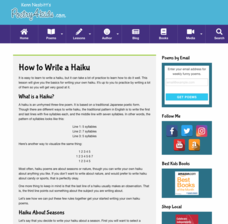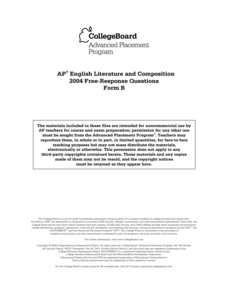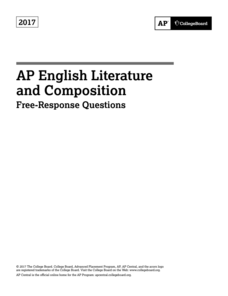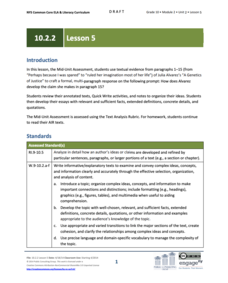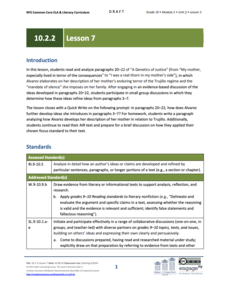Feedbooks
Anne of Green Gables
When Anne Shirley shows up in Green Gables, no one knows what to expect. An eBook version of Anne of Green Gables by L.M. Montgomery introduces readers to the spunky girl's journey and the friends she makes along the way. An author...
Penguin Books
A Guide to the Works of Jacqueline Woodson
The works of Jacqueline Woodson introduce readers to diverse characters and themes. A guide covers many of the author's best-known books such as Brown Girl Dreaming and Locomotion. Dive & Discuss and Explore & Extend activities...
Poetry4kids
How to Write a Haiku
A haiku is the focus of an activity that challenges scholars to draft an original poem. Authors discover the origin and components of a haiku, read three example poems, then follow six steps to compose their own.
Poetry4kids
How to Start a Poetry Journal
Practice makes proficient! Using a journal of their choice, authors organize pages, then begin their writing journey of on-going writing practice in which they compose all poetic forms including diamante, limerick, free verse, and more!
Poetry4kids
How to Write a Limerick
Add a little fun and fancy to English language arts with an activity that challenges scholars to write a limerick. Authors follow five rules in order to compose an original poem that contains a specific rhyme scheme.
College Board
2008 AP® English Literature and Composition Free-Response Questions Form B
Ever wondered what your dog is thinking? Scholars take a close look at two poems written through the eyes of animals and then create essays analyzing each author's technique. Pupils also read a passage to write about the literary...
College Board
1999 AP® English Literature and Composition Free-Response Questions
Have you ever felt like you are pulled into two directions? Some authors depict this feeling in their characters. Scholars choose a play or novel in which a character is pulled or influenced by two different directions and write essays...
College Board
2004 AP® English Literature and Composition Free-Response Questions Form B
Is there an art to dying? Scholars write essays describing how a death scene contributes to a novel or play. They also write essays analyzing poetic techniques an author uses and literary elements they see in a passage. Writers create...
College Board
2004 AP® English Literature and Composition Free-Response Questions
Have you ever felt left in the dark? Scholars write essays after analyzing two poems pertaining to night and darkness. Pupils also read a passage and write an essay discussing the author's depiction of characters. A third essay allows...
College Board
2008 AP® English Literature and Composition Free-Response Questions
Scholars are challenged to create essays comparing two poems in which the authors discuss fears and concerns about dying and life passing by too quickly. Two other essay questions ask writers to analyze literary elements and characters...
College Board
2009 AP® English Literature and Composition Free-Response Questions
Scholars select a novel or play and craft an essay to discuss what the symbol reveals about the characters or theme. Writers also analyze a passage and a poem to determine how the authors use literary elements to relay their messages.
College Board
2001 AP® English Language and Composition Free-Response Questions
Do pictures really last longer? A prompt from the 2001 AP® English Language and Composition Free-Response Questions asks scholars to analyze the opinion that photography actually limits people when it comes to understanding the world....
College Board
2002 AP® English Language and Composition Free-Response Questions
It is not what you say but how you say it. Scholars use an essay prompt from the 2002 AP® English Language and Composition Free-Response Questions to analyze how an author uses language to describe her past. They also support or argue a...
College Board
2002 AP® English Language and Composition Free-Response Questions Form B
"Don't go forth today." Why would Caesar's wife not persuade him to stay home? Scholars read an excerpt from the play Julius Caesar and write essays on why Caesar listened to Decius rather than his wife. Pupils then write two more essays...
College Board
2017 AP® English Literature and Composition Free-Response Questions
Music brings back a memory. One prompt from the 2017 AP® English Literature and Composition Free-Response Questions asks scholars to read a poem and write essays analyzing the relationship between music and the author's memories. Two...
College Board
2006 AP® English Language and Composition Free-Response Questions
What does your lawn decoration say about you? The 2006 AP® English Language and Composition Free-Response Questions offers three prompts in which scholars express themselves through essay writing. One of these tasks includes analyzing...
Poetry4kids
How to Write a Repetition Poem
A repetition poem is the focus of a lesson that challenges scholars to compose an original piece. To add meaning to their poem, authors choose words to repeat at the start of most lines.
Poetry4kids
How to Host an Open Mic Poetry Party
Four steps to Open Mic Night! The location, invitations, supplies, and party favors are all part of the process in planning and hosting a fun-filled gathering where scholars read aloud an original poem or one by their favorite author.
EngageNY
Grade 10 ELA Module 2: Unit 1, Lesson 19
Great minds think alike. Scholars read two texts and compare how the authors develop the same central idea. Readers analyze "Women" by Alice Walker and "Letter from Birmingham Jail" by Martin Luther King Jr. They discuss word use and new...
College Board
Beginning the Year with Local Linearity
Local linearity isn't the first thing that comes to mind to start off an AP® Calculus course. A scholarly article discusses one possible beginning to the AP® Calculus course: investigating and introducing derivatives through activities...
EngageNY
Grade 10 ELA Module 2: Unit 2, Lesson 2
What is a megalomaniac? Scholars discover the word's meaning as they read and analyze paragraphs seven and eight from Julia Alvarez's essay "A Genetics of Justice." They also read Mark Memmott's article "Remembering to Never Forget" and...
EngageNY
Grade 10 ELA Module 2: Unit 2, Lesson 3
Does trauma have a lasting effect on people's lives? Scholars dive into the topic as they read paragraphs 9–11 of "A Genetics of Justice" by Julia Alvarez, in which the author describes her family's return to the Dominican Republic....
EngageNY
Grade 10 ELA Module 2: Unit 2, Lesson 5
How do learners use textual evidence from a close reading to write a well-developed essay? Scholars try it by completing a mid-unit assessment based on their analysis of the first 15 paragraphs from "A Genetics of Justice" by Julia...
EngageNY
Grade 10 ELA Module 2: Unit 2, Lesson 7
"No flies fly into a closed mouth." Pupils consider the proverb's meaning as they read paragraphs 20–22 from the essay "A Genetics of Justice" by Julia Alvarez. They also engage in small-group discussions about how the author refines her...
Other popular searches
- Authors Purpose
- Author's Purpose
- Authors Point of View
- Authors Purpose Powerpoint
- Authors Purpose Mini Lesson
- Authors Purpose Passage
- Georgia Authors
- Authors Study
- Teaching Author's Purpose
- Student Authors
- Children's Authors
- Main Idea Authors Purpose




